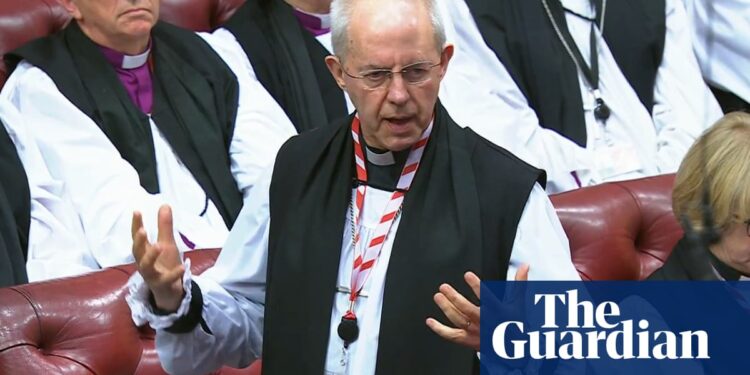The archbishop of Canterbury has apologised after being accused of making light of serious safeguarding failures in the Church of England.
Justin Welby made his final speech in the House of Lords on Thursday. The speech was criticised by a bishop who said she was “deeply disturbed” by the language used, and by an abuse survivor who said it was “tone deaf”.
The archbishop had referenced a 14th-century beheading, which prompted laughter from some peers, and suggested “if you pity anyone, pity my poor diary secretary” who had seen weeks and months of work “disappear in a puff of a resignation announcement”.
Welby announced last month he was resigning from his leading role in the church “in sorrow with all victims and survivors of abuse” after the Makin Review.
The resignation announcement came after days of pressure once the independent review concluded John Smyth – thought to have been the most prolific serial abuser to be associated with the church – might have been brought to justice had Welby formally reported him to police in 2013.
Welby initially declined to resign when the report was published, saying he had “no idea or suspicion of” Smyth’s abuse before 2013 but acknowledging the review had found that, after its wider exposure that year and despite being told police had been notified, he had “personally failed to ensure” it was “energetically investigated”.
On Friday, he said: “Yesterday, I gave my farewell speech in the House of Lords, as part of a debate on housing and homelessness. I would like to apologise wholeheartedly for the hurt that my speech has caused.
“I understand that my words – the things that I said, and those I omitted to say – have caused further distress for those who were traumatised, and continue to be harmed, by John Smyth’s heinous abuse and by the far-reaching effects of other perpetrators of abuse.
“It did not intend to overlook the experience of survivors or to make light of the situation – and I am very sorry for having done so.
“It remains the case that I take both personal and institutional responsibility for the long and retraumatising period after 2013, and the harm that this has caused survivors.
“I continue to feel a profound sense of shame at the Church of England’s historic safeguarding failures.”







